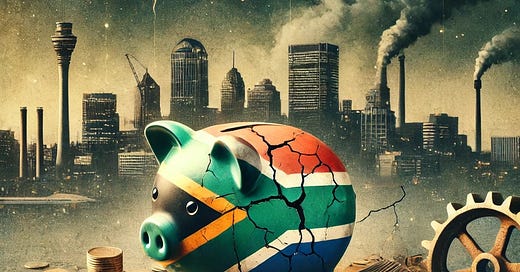To Investors
This past Friday, the U.S personal consumption expenditure reading (the Federal Reserve Bank’s preferred inflation gauge) came in at +0.2% for the month, and +2.5% for the last twelve months, in line with expectations. This figure reassures the Fed chairman Jerome Powell’s announcement that an interest rate cut will come in their September meeting so long as the economic data doesn’t surprise negatively.
So in the United States, the economy can expect a 0.25% interest rate cut from 5.5% down to 5.25% in September. This cut alone won’t make much of a difference to economic conditions in the U.S, rather the signal that the cut will give is that the Federal Reserve is ready to make financial conditions more stimulative in the U.S, which will boost business and consumer confidence in the U.S economy.
What about in South Africa?
The South African Reserve Bank (SARB) has a mandate to keep inflation around 4.5% - the midpoint of a key band of 3%-6% inflation.
Since the covid pandemic disruptions took effect, inflation in South Africa peaked at 7.8% in July 2022, and has started to trend downwards since then, but has remained sticky to only reach 4.6% in July 2024.
In the September inflation reading the SARB would need to most likely see another softer reading closer to the 4.5% figure.
Rate cuts are desperately needed in South Africa to inject energy into the struggling economy. Unemployment in South Africa has risen for 3 straight quarters, now at 33.5%, and youth unemployment also rose in the same period - now at 60.8%.
Business confidence has trended lower since peaking at 50 points in Q1 2021, and total GDP has been trending lower since 2021; from $420 billion down to $378 billion in 2023.
On the consumer side, the prime lending rate is currently 11.75% (the highest its been since the global financial crisis) which contributes to the fact that consumer confidence in the economy has remained deeply negative for the past 5 years according to the FNB/BER Consumer Confidence Index.
All that said, being their first go-to economic data point in their monetary policy decisions, the South African Reserve Bank will need to see positive (read: lower) inflation data before seriously considering a desperately needed interest rate cut and proceeding to ease financial conditions in South Africa. All other economic data might be dependent on those interest rate cuts, for any improvements to be seen in the South African economy from a financial perspective.
I hope you enjoyed reading this letter.
On the journey to becoming a master capital allocator, one lesson down, a billion more to go.
Chat soon,
Mansa




